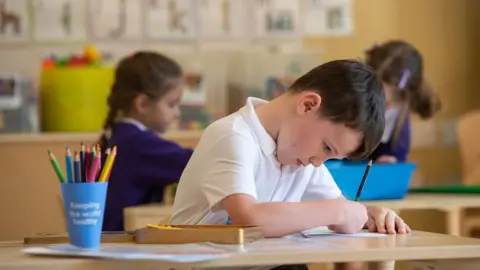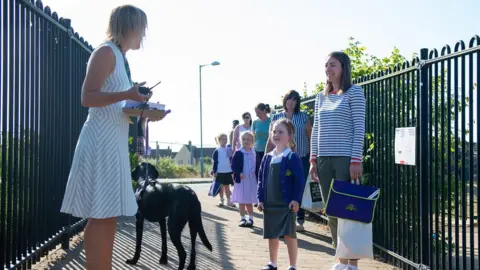Coronavirus: £1bn catch-up tutoring fund for England's pupils
 PA Media
PA MediaA £1bn fund to help England's children catch up on what they have missed while schools have been closed has been announced by the prime minister.
The most disadvantaged pupils will have access to tutors through a £350m programme over the year from September.
Primary and secondary schools will be given £650m to spend on one-to-one or group tuition for any pupils they think need it.
Head teachers welcomed the funds, but said more details were needed.
Labour said ministers should convene a taskforce - involving trade unions and scientific and health experts - to help all pupils return to school safely as soon as possible.
Shadow education secretary Rebecca Long Bailey said the plans "lack detail and appear to be a tiny fraction of the support" needed and called for a "detailed national education plan to get children's education and health back on track".
However, Boris Johnson said the fund would help head teachers provide what pupils need.
He thanked teachers, childcare workers and support staff for their efforts during the pandemic, and said he was "determined to do everything" he could to get all children back in school from September.
"We will bring forward plans on how this will happen as soon as possible," he said.
And during a visit to a school on Friday, Mr Johnson suggested there may be change in the rules on social distancing, with more guidance due "very, very shortly", adding: "Watch this space."
It comes as the Covid-19 alert level has been downgraded, bringing with it a possible relaxation of the rules that have kept many pupils out of school.
The Scottish Government said it is also looking at social distancing rules in schools, after Northern Ireland decided to reduce its two-metre rule to one metre.
Nicola Sturgeon has said she wanted schools to open safely as soon as possible.
The announcement comes a week after Mr Johnson said the government was planning "a huge amount of catch up for pupils over the summer".
But the announcement did not include any specific push towards catch-up activities running through the summer break except a expectation that usual summer clubs would be running.
Instead there is a strong push for head teachers to target catch-up help via tutoring from September.
However, schools minister Nick Gibb told the BBC there was lee-way for heads to set up summer schemes if they so wished.
But he said: "If you want children to catch up, it can't just be done over the month of August - it has to be longer term over the academic year".
Research by the Institute for Fiscal Studies (IFS) suggests the £650m pot represents about £80 extra for each student.
That is a rise of about 1% but would leave total spending still 3% below 2010 levels in real terms.
'Unjustifiable'
Early years providers and colleges for 16 to 19-year-olds are not included in the plans.
Bill Watkin, chief executive of the Sixth Form Colleges Association, said it would be "entirely unjustifiable" to exclude sixth form students from the package.
Neil Leitch, chief executive of the Early Years Alliance, said the government's decision not to include pre-schoolers "beggars belief".
But Mr Gibb said that older age groups had "fared better with remote education than other age groups" which is why the government was focused on helping younger pupils.
Schools were shut across the UK on 20 March. Apart from the children of key workers, most children have not been to school since then and will not enter a classroom until after the summer holidays.
Children in nursery, Reception, Year 1 and Year 6 have begun returning to primary schools in England, and some Year 10 and 12 pupils returned to secondary schools and colleges this week.
Schools in Wales are reopening at the end of June, with only a third of pupils in class at any time, while in Scotland, schools are preparing to reopen on 11 August.
Social distancing in schools has been halved to 1m (just over 3ft) in Northern Ireland, where ministers are aiming for a full reopening of schools on 24 August.
However, head teachers have warned that parts of the Northern Ireland plan are "unrealistic and undeliverable".
Plans for the subsidised National Tutoring Programme have been developed with a group of social mobility organisations and academics led by the charity Education Endowment Fund (EEF).
The EEF has said that until now, access to tutoring has been the preserve of wealthy families - but this would no longer be the case as schools would be able to seek subsidised tutoring.
 PA Media
PA MediaHowever, individual schools would be expected to pay 25% of the tutoring costs in the first year, or from their share of the £650m in extra funding being made available to them as part of this package.
The tutors themselves will be provided by organisations approved by the National Tutoring Programme. Many of them will be students or graduates trained by tutoring groups.
Their modelling suggests between 550,000 and 650,000 courses, featuring three pupils to one tutor, would run for an hour a week over 15 weeks.
"Tutoring is the catch-up approach supported by the strongest evidence," said the EEF's chief executive, Prof Becky Francis.
She said the programme hoped to reach more than a million pupils, calling it a tremendous opportunity to create long-lasting change.
'Long-term response'
Association of School and College Leaders general secretary Geoff Barton welcomed the investment, saying it would help support the work schools are already undertaking on pupil catch-up.
But he noted that the investment was expected to be spent on tutoring, rather than being left to head teachers to decide.
"As ever, we suspect the devil will be in the detail and we await further information," he said.
He was also concerned that there was no investment for sixth forms.
David Hughes, chief executive of the Association of Colleges, criticised the decision not to include colleges for 16 to 19-year-olds in the plans.
He said teenage college students deserved as much catch-up support as every other age group and it was "indefensible" to overlook them.

- A SIMPLE GUIDE: How do I protect myself?
- IMPACT: What the virus does to the body
- RECOVERY: How long does it take?
- LOCKDOWN: How can we lift restrictions?
- ENDGAME: How do we get out of this mess?

National Association of Head Teachers general secretary Paul Whiteman said he was pleased ministers had listened to calls for a longer-term response, rather than short-term fixes.
"This is a considerable sum of money," said Mr Whiteman, but he also warned there were many details still to be worked through.
In other developments:
- South Asian people are the most likely to die from coronavirus after being admitted to hospital in Great Britain, major analysis shows
- UK retail sales partly recovered in May after a boost in sales of DIY goods and gardening items, official data suggests
- Scotland has moved to the second phase of its four-phase "route map" aimed at ending the lockdown, allowing certain people to visit another home indoors without social distancing
- Wales' First Minister Mark Drakeford will promise to review restrictions on travel when he announces changes to Wales' lockdown later
- The Royal College of Nursing is calling for better risk assessments, working patterns and mental health care for those on the front line.

Have you been affected by the issues in this story? Share your experiences by emailing [email protected].
Please include a contact number if you are willing to speak to a BBC journalist.
- WhatsApp: +44 7756 165803
- Tweet: @BBC_HaveYourSay
- Please read our terms & conditions and privacy policy
